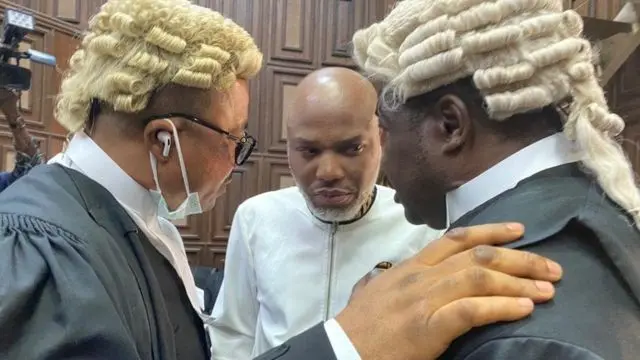Detained leader of the Indigenous People of Biafra, Nnamdi Kanu, has approached the Court of Appeal seeking an order to stop the Federal High Court in Abuja from proceeding with his trial and delivering judgment scheduled for November 20.
The separatist leader filed an application asking the appellate court to halt all further proceedings before Justice James Omotosho pending the determination of his appeal challenging the legality of his ongoing terrorism trial.
In the motion filed pursuant to Section 36(1) of the 1999 Constitution as amended, Kanu’s legal team urged the Court of Appeal to grant a stay of judgment, effectively putting the brakes on the lower court’s plans to deliver its verdict in less than two weeks.
The application represents a strategic legal maneuver that could potentially delay the conclusion of the high-profile case, which has dragged on since Kanu’s controversial repatriation to Nigeria from Kenya in June 2021.
Justice Omotosho had on Friday fixed November 20 as the date for judgment after Kanu failed to present his defense despite being granted six days by the court to do so. The judge ruled that having been given adequate opportunity to conduct his defense but failing to utilize it, the IPOB leader could not subsequently claim denial of his constitutional right to fair hearing.
However, Kanu’s lawyers have consistently maintained that the charges against their client are fundamentally defective and that he cannot legally be tried under the version of the Terrorism Prevention Act cited in the charges, which they argue has been repealed.
This legal argument forms the basis of Kanu’s appeal currently pending before the Court of Appeal, and his motion for stay of proceedings is predicated on the need to first resolve the constitutional questions raised about the validity of the trial itself before any judgment is delivered.
If the Court of Appeal grants Kanu’s application for stay of proceedings, the November 20 judgment date would be vacated, and the trial court would be restrained from taking any further action until the appellate court conclusively determines whether the terrorism charges can legally stand.
Such an outcome would represent another significant delay in a case that has already stretched over four years, with Kanu having been in detention throughout this period while his legal battles have progressed through various stages.
The Court of Appeal now faces the task of weighing Kanu’s constitutional arguments for a stay against the public interest in bringing the long-running case to a conclusion. The appellate court will need to determine whether the issues raised in Kanu’s appeal are substantial enough to warrant halting the judgment scheduled by the trial court.
Legal experts note that courts typically grant stays of proceedings when there are compelling reasons suggesting that allowing a trial to continue could result in injustice or where fundamental questions about the court’s jurisdiction or the validity of the charges remain unresolved.
Kanu’s case has attracted significant attention both domestically and internationally, with various groups calling for his release or a political solution to address the underlying grievances that fuel separatist agitation in Nigeria’s Southeast region. However, the federal government has maintained that Kanu must face trial for alleged crimes committed in pursuit of Biafran independence.
At the time of this report, no hearing date had been announced for the consideration of Kanu’s motion for stay of proceedings. The Court of Appeal’s decision on whether to grant or refuse the application will likely come before the scheduled November 20 judgment date, as the court would need to act quickly to prevent the trial court from proceeding as planned.
The development adds another twist to Kanu’s protracted legal saga and leaves uncertain whether the terrorism case will finally reach a conclusion on November 20 as scheduled or face yet another postponement due to appellate intervention.



















